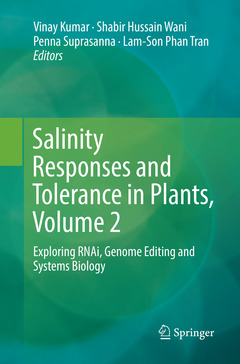Salinity Responses and Tolerance in Plants, Volume 2, Softcover reprint of the original 1st ed. 2018 Exploring RNAi, Genome Editing and Systems Biology
Coordonnateurs : Kumar Vinay, Wani Shabir Hussain, Suprasanna Penna, Tran Lam-Son Phan

Soil salinity is a key abiotic-stress and poses serious threats to crop yields and quality of produce. Owing to the underlying complexity, conventional breeding programs have met with limited success. Even genetic engineering approaches, via transferring/overexpressing a single ?direct action gene? per event did not yield optimal results. Nevertheless, the biotechnological advents in last decade coupled with the availability of genomic sequences of major crops and model plants have opened new vistas for understanding salinity-responses and improving salinity tolerance in important glycophytic crops. Our goal is to summarize these findings for those who wish to understand and target the molecular mechanisms for producing salt-tolerant and high-yielding crops. Through this 2-volume book series, we critically assess the potential venues for imparting salt stress tolerance to major crops in the post-genomic era. Accordingly, perspectives on improving crop salinity tolerance by targeting the sensory, ion-transport and signaling mechanisms were presented in Volume 1. Volume 2 now focuses on the potency of post-genomic era tools that include RNAi, genomic intervention, genome editing and systems biology approaches for producing salt tolerant crops.
Novel approaches to improve salt tolerance in crop plants
International experts share their latest findings on salt stress tolerance
Comprehensive analysis of current plant biotechnologies and their future
Date de parution : 12-2019
Ouvrage de 326 p.
15.5x23.5 cm
Disponible chez l'éditeur (délai d'approvisionnement : 15 jours).
Prix indicatif 105,49 €
Ajouter au panierDate de parution : 07-2018
Ouvrage de 326 p.
15.5x23.5 cm
Disponible chez l'éditeur (délai d'approvisionnement : 15 jours).
Prix indicatif 105,49 €
Ajouter au panierThèmes de Salinity Responses and Tolerance in Plants, Volume 2 :
Mots-clés :
CRISPR/Cas9; transgenic plants; RNAi; Phytohormones; Glyoxalases; Nanobiotechnology; Metabolomics



